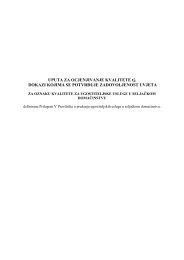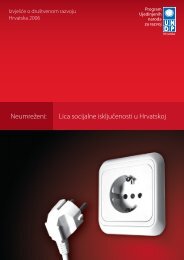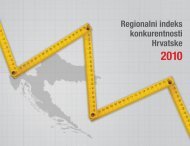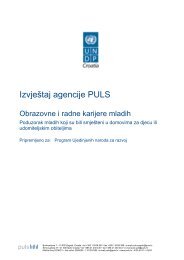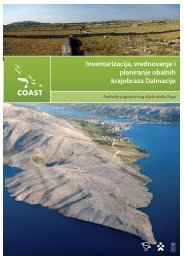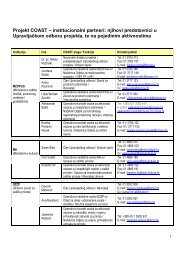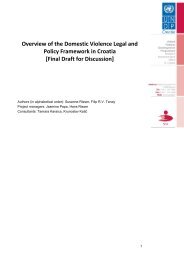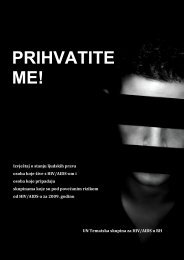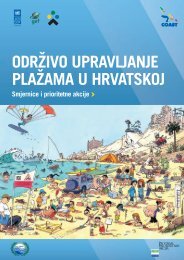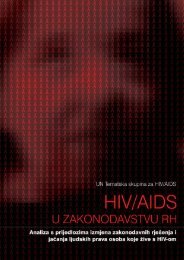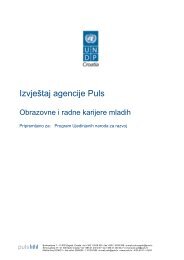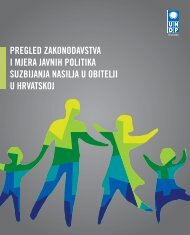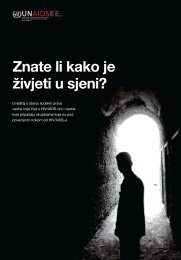WEB engleska verzija end.indd - UNDP Croatia
WEB engleska verzija end.indd - UNDP Croatia
WEB engleska verzija end.indd - UNDP Croatia
- No tags were found...
You also want an ePaper? Increase the reach of your titles
YUMPU automatically turns print PDFs into web optimized ePapers that Google loves.
THE SOCIALLY EXCLUDEDCHAPTER 3necessary to take into account the differences in experiencesbetween single fathers and single mothers. 103Finally, society’s attitude towards single-parent familiesand their members can also generate social vulnerabilityin this group. According to research, <strong>Croatia</strong>ncitizens still name “the family” as their most importantvalue (European Research of Values, 1999; Matulić,2002). However, what constitutes a family, accordingto parents from both dual parent and single parentfamilies, is primarily the support and emotional tiesbetween its members, and to a lesser extent the formalstructure of its parts. 104 It is necessary for educationalprogrammes about families and their facilitators to besensitised to the needs and problems of single parentfamilies in order to reduce prejudices towards singleparents and their children. This is the key role of theeducational system and the media, which should encouragethe values of family diversity which is a casewith a growing number of children.3.6.11 Policy ImplicationsTo resolve the main challenges, it is necessary toadopt legislative measures pertaining to the familyand social and educational policies in order to overcomethe risks of social exclusion of single parentsand their children. Such measures would include:- Improving the material conditions of single-parentfamilies, including the question of employmentand housing;- Putting in place more efficient legislativeregulations for determining and collecting childsupport (Child Maintenance Advance Fund);- Removing obstacles to accessing social rights,including improvement of the level of informationand the development of a model for providingsocial services and contributions, which wouldfollow from the paradigm of human rights;- Creating new and improved quality social servicesfor children and parents;- Sensitising society to issues of single parenthoodand the needs of single-parent families.3.7 The UnemployedBox 10: A sketch of the life of the unemployedKarolina only has primary school education. Shedropped out of secondary school during hersecond year, got married and became a housewifeand helping hand on a family farm in Bosnia andHerzegovina. Her husband, Lovro, supported thefamily and for 13 years worked as a welder in a localfactory. The war left them jobless and homeless.During the war, Karolina and Lovro were forcedto flee to <strong>Croatia</strong>, and then to Germany. Duringtheir three years as refugees they legally workedas auxiliary workers, but they were also eligible forsocial assistance, a combination which is possible inGermany. They then returned to <strong>Croatia</strong> and movedto Knin, where they have been looking for a job eversince. Knin does not have a factory where they wouldneed a welder, so that Lovro underwent re-trainingto become a bricklayer. However, employers preferworkers with some experience, so Lovro has beenunable to find a job.Karolina and Lovro are registered with the <strong>Croatia</strong>nEmployment Service office in Knin, but becauseof the poor economic activity in the region, thereare no jobs there. They say that it is possible to getsome jobs through good connections and money,but they do not have such resources. The long yearsof looking for a job have been very disheartening,and interpersonal relations within the householdare full of anxiety and edginess. To firms where theylook for a job, Karolina and Lovro are not attractiveas candidates. Being in their late 40’s, for manyemployers they are simply too old. Employers preferto hire younger unemployed people. They havealso experienced direct discrimination: “We don’thire Bosnians, only people from these parts”.Karolina sometimes works illegally with otherrefugees, and helps out in the processing plantlocated in a nearby town. She waits for a call at homeand whenever the employer calls she works severaldays a month under poor working conditions. Thewage is minimal, and she has to pay for all her travelcosts and meals. She goes to work even if she isextremely sick, because she has no right to sickleave,and she does not want to jeopardise the job.103 Single mothers, compared to single fathers, are poorer, unemployed more frequently, and they feel discriminated against more often intheir access to employment/promotion at work. Employed single mothers find work to pose difficulties in the performance of their familyobligations and chores more frequently than single fathers and they also hold that they sp<strong>end</strong> too much time at work and too little timewith their family and sleeping. Single fathers are socially more isolated, resigned and pessimistic than single mothers (<strong>UNDP</strong>, 2006a).104 The analysis of personal definitions of family has shown that love, togetherness, mutual support, harmonious relations, understandingand trust, as well as security and protection, are most frequently voiced as what defines the family, and less frequently the community oftwo parents (married) and children (Raboteg-Šarić et al., 2003).77



